Top 9 Enterprise CMS Platforms

Digital marketing is a multi-channel affair these days. Still, the point of engaging audiences across the far reaches of cyberspace is to shepherd them to where leads convert: your company website. It’s the one environment where you have total control of the content, layout, and aesthetics that your audience will experience. There’s no better place to show off exactly what you’re all about and what you can deliver for your customers.
However, trying to turn the website of your dreams into reality often bumps up against the barrier of technological limitations. While you can do almost anything with a website, that doesn’t mean the execution will be easy. That’s why so many businesses rely on Content Management Systems to build and maintain their websites.
With an enterprise CMS platform, you don’t need expertise in design or coding to create or update web pages. The platform provides all the tools and resources needed to build a functional, fantastic-looking website full of relevant and interesting content.
With more than 63 million websites using a CMS, it’s hard to keep pace if you’re building your entire site from scratch. Don’t hold out for homespun websites to make a comeback, either. The global CMS market is growing by more than 16% annually and is projected to exceed $123 billion by 2026.
Choosing the right CMS for your enterprise can be challenging. There are a few high-profile platforms that command the lion’s share of the market. But depending on your vision, the nature of your business, and your customers’ expectations, you might find that a niche-oriented platform meets your needs better than a popular option. To make the decision easier, we’ll take a closer look at the eight best Enterprise CMS platforms currently available.
What is an Enterprise CMS Platform?
A CMS is a software solution used to organize and manage documents, images, and other forms of digital content. With workers spending as much as 20% of each day looking for lost or misfiled documents, a CMS can provide substantial benefits for organizations with lots of content to keep organized.
Most CMS platforms include tools for editing content and publishing it to the web. They allow users to easily create dynamic web pages full of rich content without learning HTML or other coding languages. CMS platforms often include templates, plugins, and other enhancements.
A CMS platform can be appropriately placed in the Enterprise CMS category when it is designed with large-scale projects and multiple users in mind. An Enterprise CMS solution must be able to do the following:
- Handle large content libraries with various file types
- Structure resources according to various organizational models
- Utilize advanced content search features like filters and tagging
- Allow multiple users to collaborate on the same documents
- Use permission structures to protect content and maintain data integrity
- Create an auditable record of user access and file modifications
Note that an ECM (Enterprise Content Management) solution is not the same as an Enterprise CMS platform. ECM solutions are exclusively focused on document management. They won’t necessarily include a CMS platform component for managing websites, because an ECM might be used strictly for internal resources. For outward-facing content created for your audience of customers and potential buyers, you need an Enterprise CMS.
Choosing the Right Enterprise CMS Platform
The world of CMS is dominated by a few big-name platforms — for instance, 42% of the web is running on WordPress. However, there are many options to choose from, which means that businesses with special requirements can find a CMS solution that’s a perfect fit for their situation.
Several factors should be considered when selecting an Enterprise CMS. First and foremost is its ease of use. The best CMS platforms are designed to be used by a wide range of individuals within an organization, including those without specialized web design skills. If collaboration is one of your objectives, your CMS solution should be easy to pick up and start using.
Customizability is also crucial. Without the ability to easily incorporate extensions, add-ons, and other external features, it’s hard to create a unique website that can provide the exact user experiences you envision. The right add-ons will enable you to track customer journeys and deliver compelling, personalized content at opportune moments.
Other considerations include security, data portability, how much ongoing support you can expect to receive from the vendor, and of course, the price tag.
Top 9 Enterprise CMS Platforms
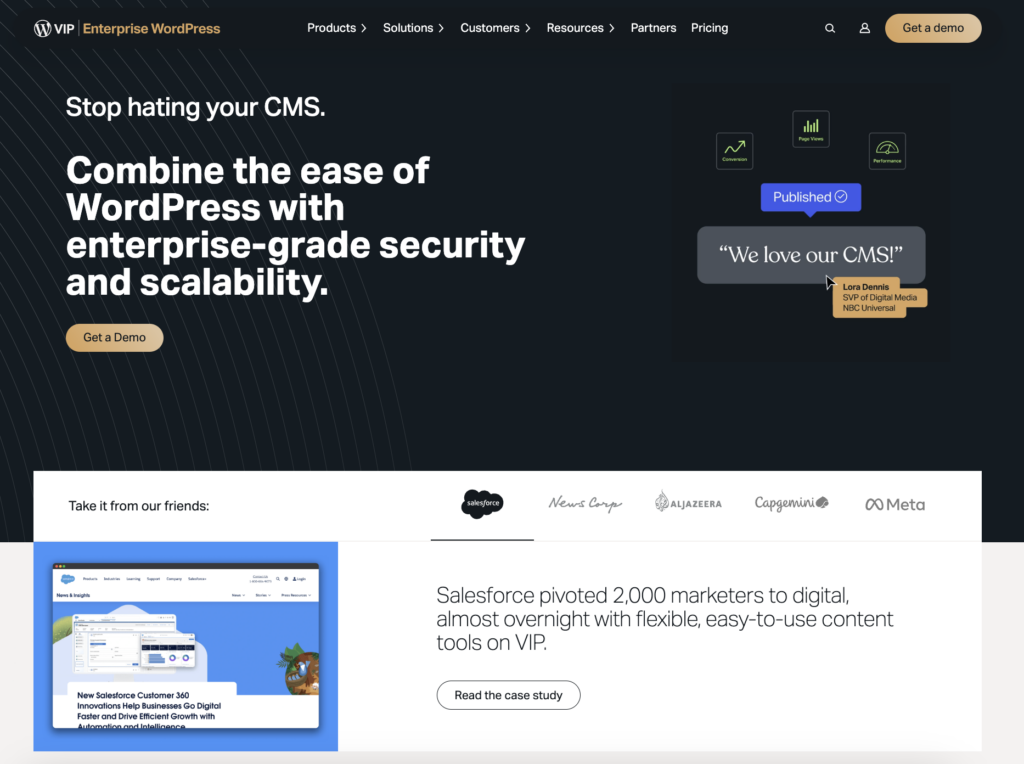
Purpose built for the enterprise, large media brands, and government agencies, WordPress VIP combines the ease and flexibility of WordPress—the CMS that runs 43% of the web — with unmatched scalability and security. With WordPress VIP, businesses can scale their web presence, enable their teams to produce more web content, and use data to continuously improve content performance, eliminating wasted effort while maximizing ROI.
Price: By request
Reviewer says: “We needed agility, we needed stability, and we needed security. We’ve got all three of those now with WordPress VIP, so now we can focus on the business part of our business instead of the infrastructure.”

HubSpot’s powerful but flexible CMS platform features a drag-and-drop interface that makes it incredibly easy to create a custom website that can grow along with your company. CMS Hub includes built-in tools for SEO optimization and A/B testing, provides excellent user support, and integrates well with your favorite add-ons. HubSpot CMS is one of the more expensive solutions, which may put it out of reach for smaller businesses. Some users find its reporting features limited.
Price: $900 per month for the Enterprise version
Reviewer Says: “HubSpot’s UI is top-notch and most of the tools are pretty self-explanatory.”
3. Magento
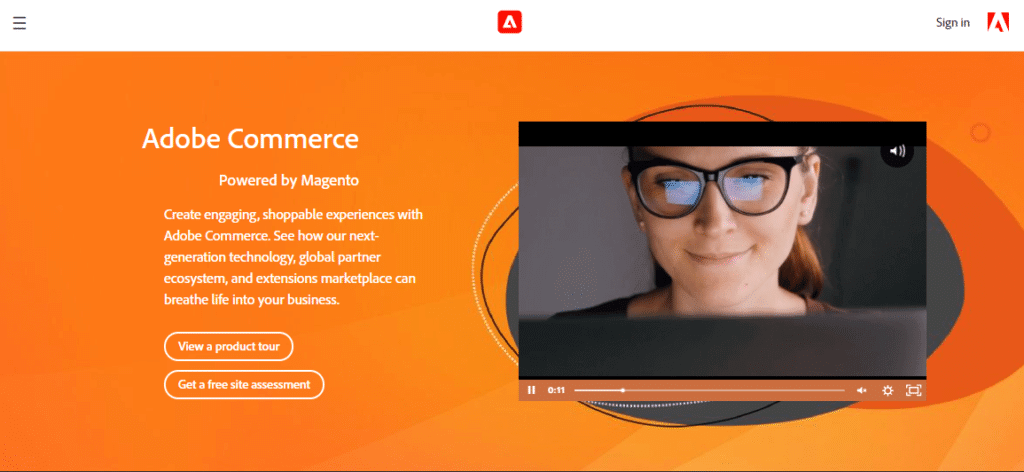
Built for serious e-commerce, Adobe’s Magento is a professional CMS platform that can handle the demands of large-scale, high-volume merchants. It has a steep learning curve, but the security, scalability, and possibilities for customization can make it worth the effort. There’s a free open source version, and the paid version includes both hosting and user support.
Price: Starts at $22,000 per year
Reviewer Says: “When you have thousands of products and need a platform that can handle changes quickly as well as perform quickly, then Magento is one of the best choices.”
4. Salesforce Experience Cloud
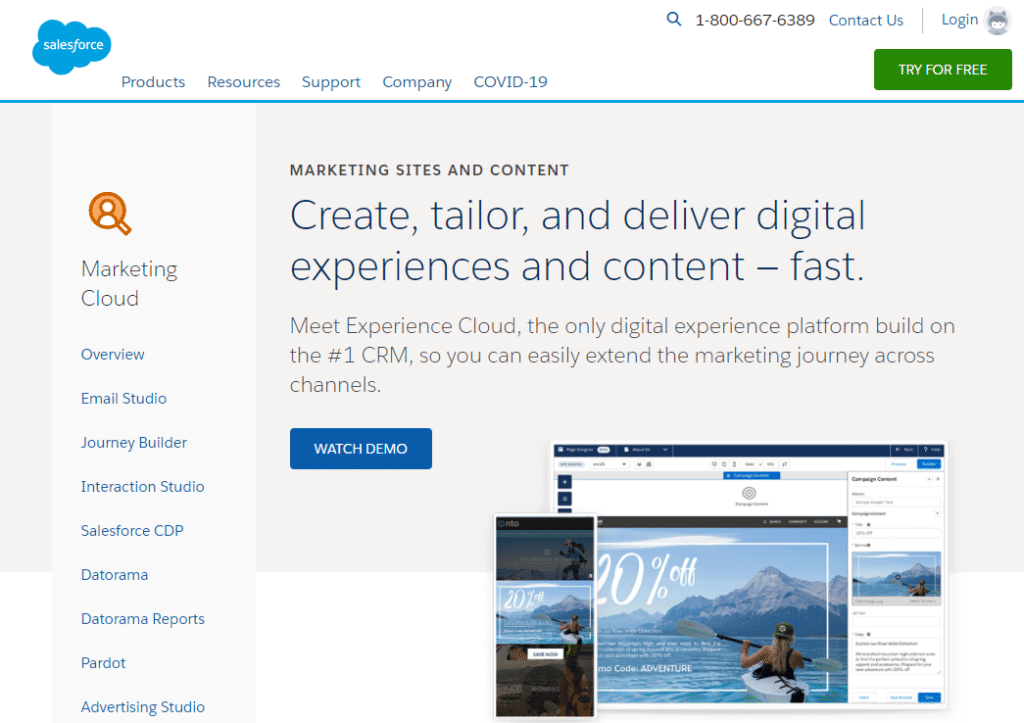
Salesforce offers a newly-rebranded CMS platform that’s an excellent fit for large organizations that engage in omnichannel marketing. Learning how to use it can take some time, but Salesforce CMS plays nicely with both developers and third-party add-ons to allow for endless customization options. This hybrid solution provides content creation and language translation tools to help deliver engaging messaging through all of your marketing channels.
Price: By request
Reviewer Says: “It has a ton of detailed fields and analytics that can help your business grow its customer base and drive your dashboards higher. Plan to have a lot of upfront training and ongoing training with the software.”
5. Adobe Experience Cloud
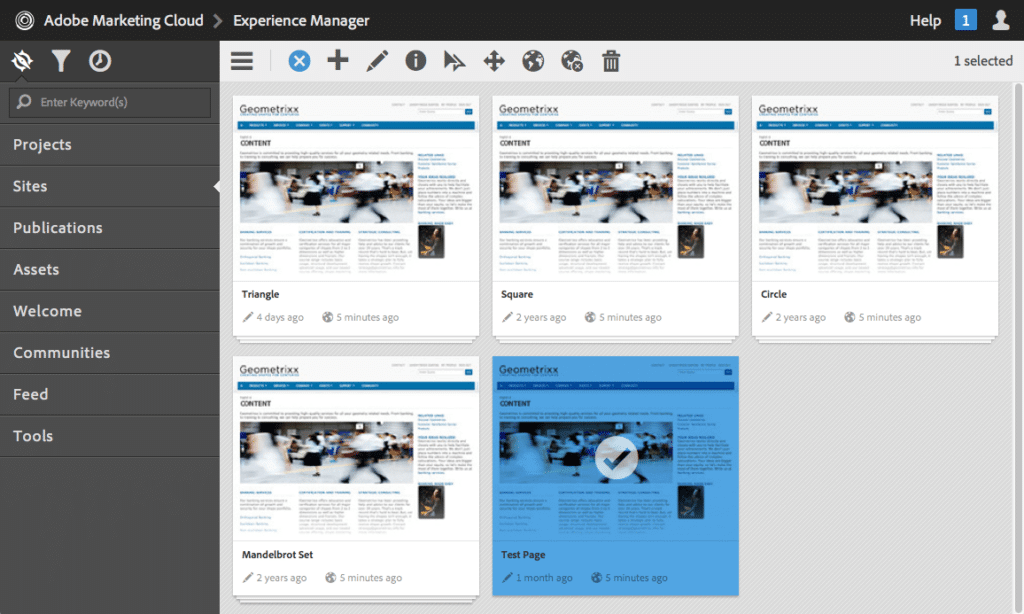
Adobe’s entry into the Enterprise CMS derby is highly customizable and robust for managing all types of content. It offers web content management, cross-channel content, personalized experiences, and even AI-powered scalability. The platform is versatile and enables tracking of customer data to optimize both visitor experiences and conversions. On the downside, the software requires regular updates, and using it in any other variation other than out-of-the-box requires a bit of IT assistance. However, if your business runs on Adobe products like Creative Suite, their CMS can be a seamless solution.
Price: Variable, depending on implementation needs.
Reviewer Says: “The web is the repository of all our product information, videos, downloads, as well as enables our Demand Gen through landing pages and lead generation forms. It is at the center of the Marketing hub and represents multiple touch points along our buyer’s journey.”
6. Bloomreach Experience Platform

Bloomreach is a digital experience management suite with a heavy e-commerce focus. Users can tell engaging stories across multiple customer touchpoints and drive visitors towards purchases with personalized content. It also has a feature that dynamically increases the SEO value of web pages. The CMS boasts an open, flexible architecture and the ability to automate such tasks as operational processes or product launches.
Price: Custom pricing starts at $10,000/month, with fees variable depending on client requests.
Reviewer Says: “Bloomreach is a great tool for smaller companies if they want to improve on merchandising. It’s helpful if a company would like to look at customer trends and shopping habits on their website and how they can improve the website experience to make it easier for consumers to shop.”
7. Sitecore Experience Platform
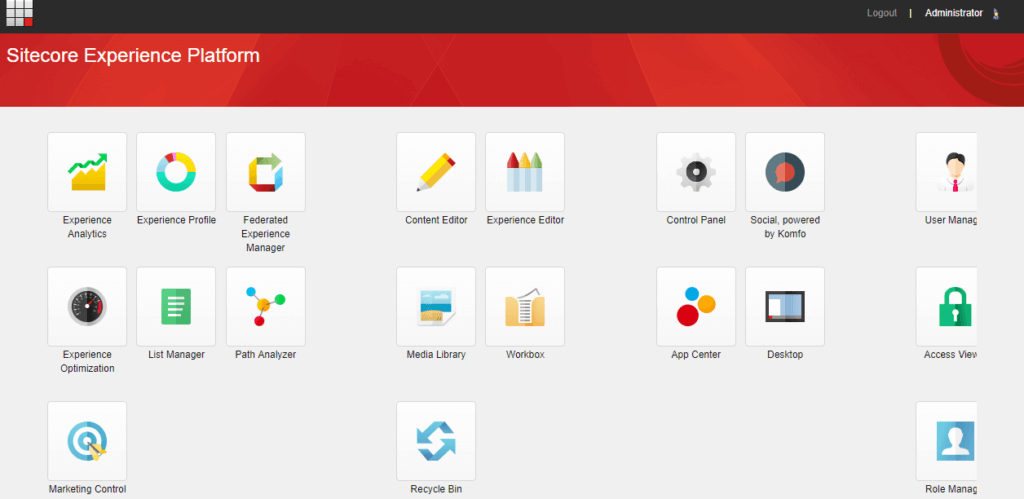
Sitecore XP is a powerful CMS that also integrates with Sitecore’s Content Hub. It is considered one of the more easy-to-use Enterprise CMS available on the market. Features include asset management, content scheduling, and a capable UI for editing content. One of the selling points is the ability to create personalized customer journeys in real-time across any channel. However, the reportedly high licensing cost creates a barrier to many businesses utilizing the platform.
Price: By request
Reviewer Says: “The CMS has a tremendous amount of control for admins. There are lots of indexing or publishing tasks that can be done without leaning on a development vendor. The amount of available tools to plug in abound as well, though caution is needed in making sure these tools actually meet expectations.”
8. Joomla
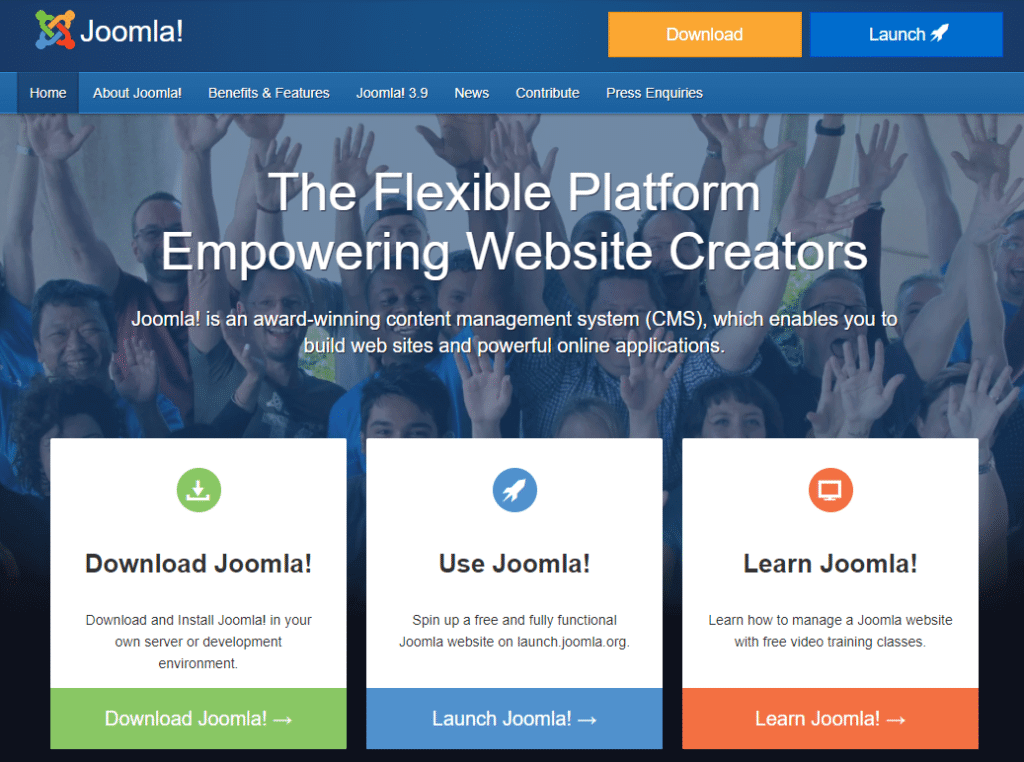
Another open-source platform, Joomla’s content and language tools make it well-suited for websites that include social or community-building aspects. It’s been around since 2005, so there are many templates and add-ons made for it, but you may run into some that are no longer supported.
Price: Free
Reviewer Says: “Joomla has ironed out its quirks over the years, and now presents itself as a professional content management system with a good set of plugins.”
9. Webflow
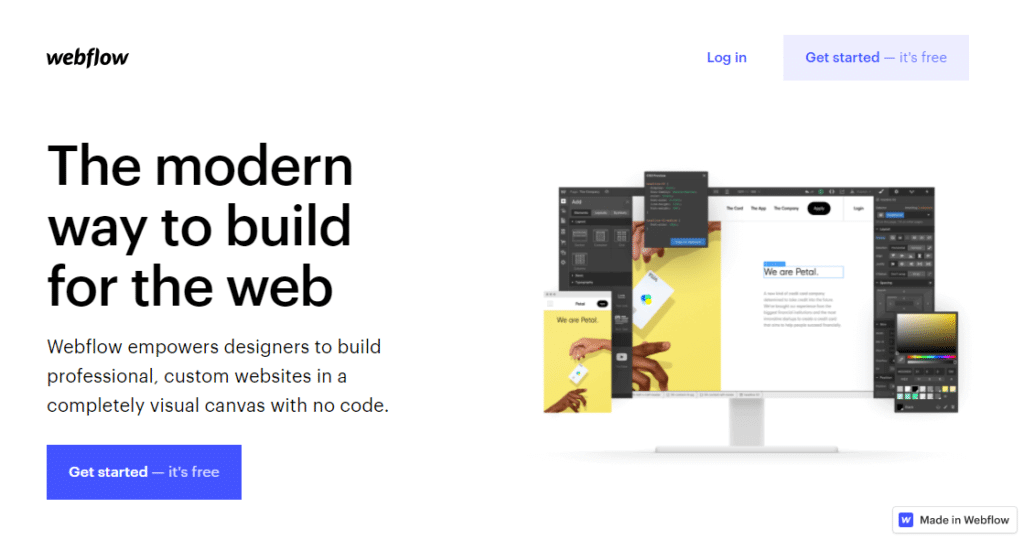
As a platform for both CMS and visual web development, Webflow is a design-oriented package. It makes it easy for non-coders to create gorgeous web pages that users won’t want to click away from. Webflow’s template library can get you started, and the editing tools and third-party integration options will allow you to customize your site exactly the way you want it. Visionary designers will love it, but teams may struggle with the limited collaboration features.
Price: $16 per feature, per month
Reviewer Says: “The flexibility is amazing, you essentially have the creative freedom to create whatever you can imagine because Webflow makes it so simple to do.”
Make Your Website a Conversion Engine
Change happens fast in the world of ecommerce, and it can put you at a big disadvantage when site updates are delayed because you can’t track down the content you need or publish it quickly and seamlessly. An Enterprise CMS platform is the right tool to get around these obstacles and keep your web presence fresh and relevant.
Today’s consumers expect engaging, personalized content experiences delivered over their preferred communication channels. To meet this demand, businesses need to be able to draw upon deep reserves of content and present it in an appealing and eye-catching way. Enterprise CMS platforms meet this challenge by streamlining the process of finding, modifying, and publishing the right content at the right time. With the right Enterprise CMS platform working behind the scenes, your business website will become the high ROI conversion engine you need to succeed.